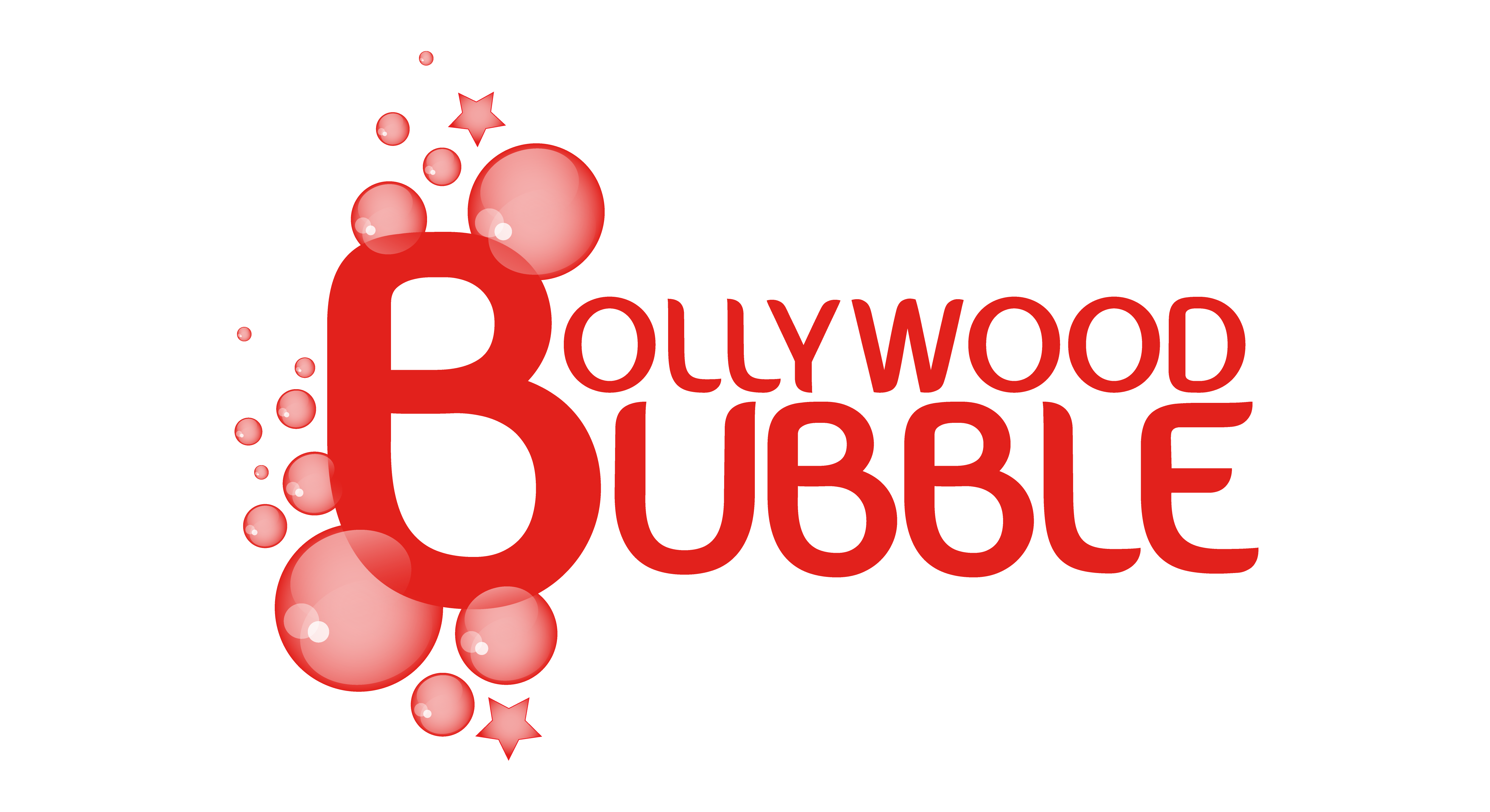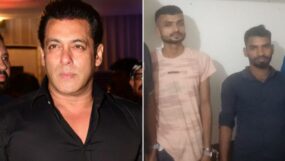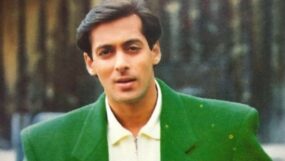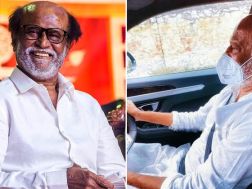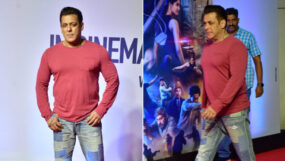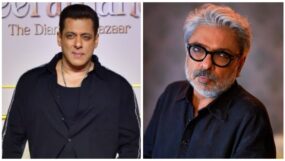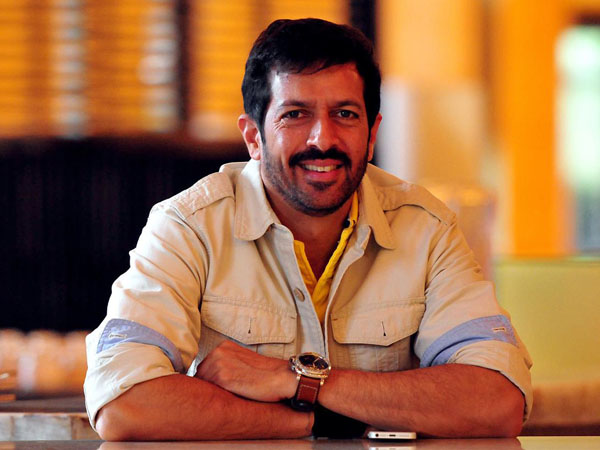
Promotions have become a very important part of a film. Events, interviews and appearing on reality shows, are the most important aspects of promotions. Earlier, only actors would promote their films, but lately even filmmakers have become a very prominent part in the promotions. Recently, we met Kabir Khan who is currently busy with the promotions of his film ‘Tubelight’ which stars Salman Khan in the lead role along with Sohail Khan and Chinese actress Zhu Zhu in pivotal roles. Not many filmmakers have guts to speak their mind, but Kabir was not at all hesitant. Here’s an excerpt from the interview:
This is the third time you are working with Salman Khan. So, have you seen any change in him and how was it working with him again?
I see an evolution of approach. In ‘Ek Tha Tiger’, he was a little blase, like we have done it all… no need to prove anything to anybody. And then in ‘Bajrangi Bhaijaan’ I saw him involved in the character. He would start thinking like the character, would Bajrangi do this? Would Bajrangi not do this? But, ‘Bajrangi…’ came very easily to him because in that film we were dipping into his inherent charm. He is a very charming person when he wants to be. ‘Tubelight’ is far more complicated. It is his toughest role till date. He plays a man-child, so he can never look normal and never look off. We need to go a little over the top in these kinds of portrayal which is often seen in cinema – in Bollywood and in Hollywood. And I think it’s doubly difficult for him because he is playing man-child. It is Salman Khan approaching that thing, if a newcomer does it, it is difficult enough, but there’ no baggage. Here it’s a man who is an epitome of machismo in our industry, epitome of action films, who is suddenly playing this vulnerable, sensitive boy man. But, I think he’s pulled it off.
How did you convince Salman to do this film where he plays such a vulnerable character?
I think the journey started in ‘Bajrangi Bhaijaan’ when he decided to take on the film, which I think was an antithesis of what he was doing from past eight to nine years and was doing successfully. His film and my film, which was an action film, and was one of the most successful was ‘Ek Tha Tiger’. We could have easily gone on to another action film; I think that would have been a safer thing for us to do. But, we said no, let’s try something different because I do feel that when you are successful is when you should make the changes. The journey started with ‘Bajrangi…’ with the commercial success it got. We realised that audience is open to accept him in a different avatar, and I think it’s often the industry that limits the film by thinking that yeh audience ko nahi chahiye. Audience is open-heartedly accepting anything which is new, which is refreshing, which is a good story. Story is king, it is definitely bigger than any of the stars, and all of them put to together. I think ‘Baahubali’ has completely proven that. So, story is what ultimately matters. I think it is very easy for me. When I narrated ‘Tubelight’ to him, he initially identified with the character. I think for him it’s not the character, now it has become important for him what the character stands for, what are the values this character is sending out to the audiences. In ‘Tubelight’, he has open heartedly adopted the character.
What were the preparations that went into Salman playing a man-child?
Preparations are something Salman Khan will never admit to. I think it’s not cool enough to do that. But, this is the first time I found him really prepared. This is the first time I found him struggling to, in a way, get a hold of this character. In the middle of the night, he used to call me and tell me, “Kuch reference de.” And I used to be like, “Main kaha se reference du?” He was like, “Hollywood mein kuch reference hai?” I said, “Nahi hai.” We came up with films like ‘Forrest Gump’, but then in that film also Tom Hanks has an A-tonal approach. He is very happy or sad, he is monotonal that didn’t work out for his character as I wanted him to be excitable, I wanted to cry, laugh. There was no real reference to give him. There was one person he knew, he called him and he met that person because he was probably close to this character. But then he would keep asking if the character would do this and if the character would do that. So, that was his preparation, just sitting and thinking about his character. Even today he has a gut instinct that this is what we should do and let’s not over prepare for it. But, in this I could see him prepare and I realised that on the first day of the shoot. So, I became a bit cruel and on the first day of the shoot I made him do the climax. I said I am just going to throw you in the deep. And on the first day of the shoot in Ladakh, when we were about to shoot he disappeared. I was wondering where’s Salman gone, somebody is saying vanity mein hai, bathroom mein hai, idhar hai, udhar hai. He came after 40 minutes, and he came pretty much in a zone which I have never seen him. He is somebody who would be whistling and laughing, and the moment you say action, he will start crying. So, he never prepares and enters a scene, but I could see that he was trying not to have interaction before that scene. I asked him if you remember everything, he said yes, and we rolled. That is a single take scene which has gone into the edit as is. He performed something and I realised where he was from last 40 minutes because there are a lot of elements in that scene which I had not told him. He had thought about it, he had prepared and he had come. For me that was really heartening as a director because for me the journey is simpler as I suddenly realised that as an actor he is taking care of his character, I just have to make sure that the consistency remains.
As you mentioned that story is the king, but having a superstar like Salman Khan changes the economics of the film completely. So, do you think the film would have changed in anyway, keeping the content same but probably not Salman and someone else in it?
Absolutely, you are right. When you have a superstar in your film, the dynamics change. The opening becomes bigger, the expectations also become bigger. So, if today ‘Tubelight’ stops at 200 crore, it would have made money, but people would say bakwas hai. But, if any other star makes 200 crore, he will be proclaimed king. So, dynamics definitely change, but our audience has very clearly shown us now that ultimately it’s the story that is the king. I don’t want to take names but there have been films with superstars that have come and have not delivered the business that they were supposed to do. People will come in huge numbers on day one, and with that same speed on day two. And ‘Baahubali 2’ has shown up, I mean no lack of respect to the stars who are there in the film, but they are not stars in our world. We knew Rajamouli, so the star of that film is the director which I think is a very positive development. Even in terms of ‘Dangal’ it is more about the girls not about him (Aamir Khan). Even in ‘Bajrangi Bhaijaan’ I used to joke with Salman that you are the supporting actor, it’s Harshaali’s film. And audience took these films in a huge way.
What has been Salman’s biggest influence on you?
I think Salman has helped me, which I would have earlier given credit to Aditya Chopra. Sometime I get in a rut of finding logic and finding the context to everything. I think both Aditya Chopra and Salman have helped me and said that sometimes just fly. Take a cinematic liberty and don’t get so disturbed by it, which I think has definitely helped me. He has helped me sometime to approach a scene in more flair and throwing a little bit of logic sometime out of the window. Not like people would say that this is completely illogical, but sometime it really doesn’t matter. Earlier, I used to argue that it does matter. So, I think that is what he has really helped me with. And what I have contributed to him is like dude it (logic) does matter. It’s the blending of the two sensibilities that has worked for the audiences. He allows me to fly a little and I don’t allow him to fly too much.
How much inspiration have you taken from ‘Little Boy’, and why ‘Little Boy’?
It’s an official adaptation. There’s something about story that I have really liked. Having said that it’s the story’s plot points that we have taken, we have changed the characters, we have changed the historical context. Initially, after ‘Ek Tha Tiger’, I was offered remake rights of a lot of Hollywood blockbusters, and I was so excited. I was like my next 10 years is taken care of, main ek-ek karke yeh sab banaunga. I went through these films for two months and I could not pick up even one film because I suddenly realised that none of them are fitting in the Indian context properly. I will be retrofitting them, I will be fixing them by force and they can never work. I would not like to name them. Some of them are made by other filmmakers and they have not worked. So, I just felt that it is very difficult to take some other culture story and have it fit into your culture and your historical context. Out of the blue, one of my assistants gave me this film and said watch this film. It is a film about the teachings of Bible. I was like mujhe kyu dikha raha hai, mujhe nahi dekhni, he said sir aap dekho. I saw the film, I was like leave aside the Bible, there’s something about the story point which I am really liking and I can see the film setting into my context, even better than the original. So, we called the filmmakers and said if you don’t mind we would like to adapt it and not remake it. Will you sell us the rights? They were more than happy.
But, ‘Little Boy’ was not a hit. So, that wasn’t your concern?
If that would have been my concern then I would have taken up those blockbusters. And honestly, taking a film that has been a blockbuster in Hollywood, there’s no guarantee that it will be hit here. We have to understand that we are two different cultures. ‘Little Boy’ is an unknown film, all of us know about it because of ‘Tubelight’. Nobody has seen this film. In the US also the film did no business. But, what attracted me was the story point.
Shah Rukh Khan has a cameo in the film. So, how was the camaraderie between him and Salman on the sets?
It was beautiful. These days they are close friends. So, there was a lot of warmth and affection. I have known Shah Rukh for years. He was the only person I know when I landed up in Bombay. I didn’t know anyone in the industry except Shah Rukh Khan. We were in same college, he was my senior in film school, Gauri and I had danced together in West Side story. So, I told Salman that I think we should get Shah Rukh and he (SRK) was ready instantly. That day the entire crew became an audience, sab kaam chhodke baithke dekh rahe the because of the energy of the two of them. They both are powerhouses and to see them together after 20 years, it’s going to be a treat. You might like the film or you might not like the film, but that scene everybody will enjoy. It’s a very important scene, it’s a very sweet scene between the two of them and shooting it was a treat.
What was the difference between directing Salman Khan and Shah Rukh Khan?
I actually found a lot of similarities between the two. It’s a very small shoot I did with Shah Rukh for ‘Tubelight’, but I did another shoot with him a short film for Dubai tourism. It’s very difficult in that short exposure to say what are the differences or similarities. But, in that one shoot I found both of them approaching the scene pretty instinctively. They don’t over prepare. Even Shah Rukh, I read out the scene to him, explained the scene to him and that’s it! He didn’t ask me too many questions. Then when we were on set, I said okay let’s do this and he pretty much followed what I was doing, but then he brought in what only he can bring in very instinctively. Same is with Salman, he doesn’t like over preparing. I also don’t like over preparing. I get bored in the readings. The energy comes on the sets when the camera is there; lights are there, when the background cast is there.
The film is set in 1962, but recently you said that it is very relevant in today’s time. So, is it co-incidental or you have kept it that way?
No, it was not co-incidental. I don’t think I would have been attracted to a story if it was just limited to what happened in 1962. The reason why I got attracted to the story was that it’s a 1962 story, but so relevant today. We are not really talking about the issues of the war. The war is completely in the backdrop. We are not getting into details of how the war started, how it ended. What’s very important in this film is that, it’s actually a film dedicated to the families of soldiers. It’s about the war and battle they have to fight when their loved ones go for war. Within five minutes you will forget that the film is set in 1962.
Tell us something about Zhu Zhu. We haven’t known much about her and we haven’t seen her much in the promos…
Deliberately! I am one of those filmmakers who believe that we tend to over expose our films before the release and I don’t like that. In ‘Bajrangi Bhaijaan’, I was very adamant that I won’t let anybody see Harshaali before the film releases and that worked for the film. Zhu Zhu is a very strong and a very integral part of ‘Tubelight’ and I would like the audiences to discover her in the film. I didn’t want to demystify Matin also, but he is such a bundle of joy that we decided to show a jhalak of him.
Was she aware of Salman’s stardom?
She did her homework and came. She probably was not aware about it initially, but the moment she got to know about the project she researched.
So, Bollywood is yet to make it big in China…
Definitely! Bollywood is still not so well known over there. There are some films that have released and made a dent, some have not released. Like ‘Bajrangi…’ didn’t release there, but it is the most downloaded online film in China. When I went there I came to know that they all have seen it, but it was not released in China because they don’t release political films in China.
Did you see any problem in release of ‘Tubelight’ in China as this one has a slight political backdrop?
It does, so I really don’t know. Anyway in China it is like after you release the film in your home country, you have to submit it there. Then they evaluate the film.
There were reports that you had Akshay Kumar in mind for Sohail’s role in ‘Tubelight’…
Nahi, I don’t know Akshay ka naam kaha se aaya. We had never reached a point where we were actually discussing names. We had definitely discussed the possibility of casting other actors. There was a great advantage that Sohail is bringing to the film. It helped me move the screenplay faster. With Sohail and Salman, it was like one shoot and you know you can proceed the storytelling from there.
You are also entering into the web space. Not just the filmmakers, but even the actors are showing the interest the web…
It is the future. We tend to say web web web , but ultimately it’s the content. Our films are being watched much more on the web through piracy unfortunately. Anyway, in the West, they have changed the game. Today, Hollywood makes two million dollar films like ‘Spotlight’, ‘Moonlight’ and they make two hundred million dollar films like ‘Avengers’ and the big franchises. The middle ground of drama story-telling has completely shifted to the web platforms like HBO, Netflix and Amazon. That’s the future what’s going to happen here also. For me, I am basically the content creator and it doesn’t matter where you watch my content. 70% consumer of my products are anyway on the web. The subject which I have the story about the Azad Hind Fauj is better said as a mini-series than as a film. Two, it’s an international story, through Amazon it’s going to release in 204 countries worldwide on day one. There is certain liberation of story-telling. Whatever boundaries we push, there is a certain Bollywoodisation of the story. In web-series, a Japanese character has to speak Japanese I don’t have to think isko main Hindi kaise bolvau.
So, is Saif Ali Khan playing a role in it?
Nothing has been locked as yet. I am in talks with a lot of people. But, only after ‘Tubelight’ release I will start locking.
Any plans of casting Salman in your web-series?
I doubt it, but nothing has been confirmed yet.
‘Tubelight’ is said to be Salman’s shortest film.
No, shortest was ‘Ek Tha Tiger’. This is 2 hours 16 minutes; ‘Ek Tha Tiger’ was 2 hours 13 minutes.
You are not directing ‘Tiger Zinda Hai’.
I don’t do sequels. That’s something which I have famously said, I don’t react to sequels. Until I get excited about it I won’t do it. Having said that, I think I have, out of all the characters that I have created in my films, Tiger is probably the one character that should have a sequel and I am glad that Ali Abbas Zafar is doing it. And whatever I have seen about it, I think it’s great.
There were reports of you doing a film with Hrithik Roshan.
I am definitely speaking with Hrithik as I am speaking with a lot of other actors. I mean that’s our job right to keep discussing ideas. But, nothing is confirmed till it’s confirmed. So, the day there’s a script that Hrithik and I agree, we will work together.
These days Bollywood relies on promotions. What would you like to say about it?
I don’t like it. We overdo it. There is no evidence that anybody has shown me that this (promotions) leads to more ticket sales. I can tell you it does not lead to more ticket sale. It just feeds media, it feeds advertising, and it feeds television channels. I honestly believe we over market our films. As long as you are able to tell the audience that this is the date my film is coming, this is what you are going to see, may be a few interviews. Biggest example of it is ‘Dhoom 3’, do you guys remember interviewing Aamir? And if we do, we should only do group interviews.
‘Eat Sleep Bollywood Repeat’ is his life Mantra. Dance is his first love and Rani Mukerji is his eternal crush. He is someone who loves being himself, and as for the ones who don’t agree, his reply? “Talk to my hand!”
